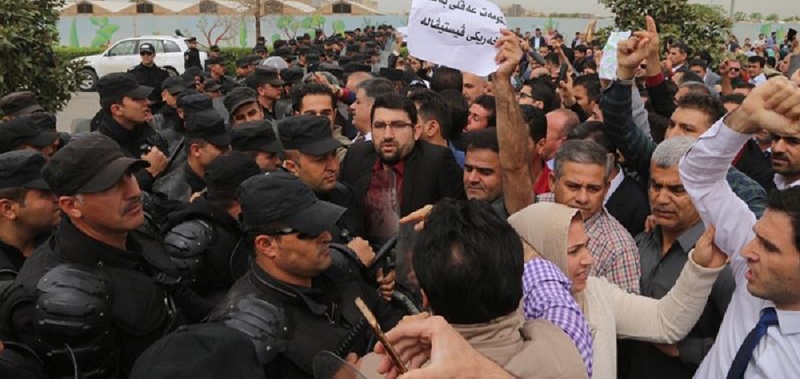Alwaght- Amid protests in Iraq’s capital Baghdad and southern cities, on February 22 protests erupted in the Iraqi Kurdistan region’s Sulaimaniyah city as thousands decried poor services and the ruling elites’ “corruption.” The protests, called for by New Generation Movement’s leader Shaswar Abdulwahid, saw people’s demands related to economy, politics and administration.
Addressing the demonstration, Abdulwahid said that if the demands are not addressed by the authorities, larger protests attended even by millions will be arranged. Regardless of his ability to organize ‘million-man” marches against the regional government, the recent demonstrations that saw thousands taking to the streets indicate that the Kurdish region like Baghdad and southern cities of Iraq has the potentials to engulf in a crisis.
But what are the causes of the protests? Can new protests erupt in the autonomous region prospectively?
People unhappy with deteriorating economic conditions
Since 2003 when a new administration was formed in Iraq and the economic affairs of the Kurdish region were left to the Kurdish Regional Government (KRG), the people of the region did not hide their discontent with the poor economic management of the authorities. The popular anger resulted in protests in 2011, 2014, and 2017. The people are in fact unhappy with the living conditions, income, business, employment, distribution of wealth, and failing economic system in the autonomous region.
Like in other parts of Iraq, a large number of graduates in the region lack job and source of income. The living conditions of a major number of Kurdish households are low and beneath the acceptable standards. A United Nations report suggests that 36 percent of the citizens of the Kurdish region have an income of less than $400 a month.
The situation even became worse when in late 2013 the government of Prime Minister Nouri al-Maliki cut off the Kurdistan share from the federal budget, leading to a KRG crisis in the ability to pay its employees. As a result, the government cut the salaries to half and in next steps it even had to pay only one-fourth of the salaries.
The austerity measures triggered demonstrations in December 2017 in Sulaimaniya, in which 5 protestors were killed. In the present conditions, there is a level of dissatisfaction with the poorly functioning economic system though the pays have backed to normal. This situation should be majorly blamed on flagrant corruption.
Discontentment with comprehensive power grip
Yet another reason for the eruption of the protests was discontentment of citizens and small parties with restriction of power in the hands of two major parties the Kurdistan Democratic Party and the Patriotic Union of Kurdistan. Since the autonomy of the Kurdish region in 1991, the two major parties established a bipolar political system that restricts the power in the hands of its leaders. This system makes any political, economic, and social changes depending on the two parties' will and action.
The two-administration system— one in Erbil and the other in Sulaimaniya— caused a deadly civil war between the two parties between 1994 and 1996. After 29 years, this situation still continues, leaving the residents extremely frustrated and run out of patience. The people either spontaneously or by the call of the small parties have been ready to protest this form of power hold.
Parties’ competition and exploiting the protests
Partisan reckoning is another drive for the protests. The two major parties use such protests for their political agenda against each other. In 2011 and 2014 the same thing happened when the two parties penetrated each other’s bastions to provoke demonstrations for political reckoning. During the protests, the supporters of the Patriotic Union set fire to the headquarters of the Kurdistan Democratic Party.
The new demonstrations, called for by the New Generation Movement, are no exception. Though the protests have their driving force in the social unhappiness with the officials’ economic and political performance, the role of the parties in inciting the people to raise their voice can never be underestimated.
Now Abdulwahid, a businessman-turned-politician who has been recently under pressure to pay off debts to the government, intends to remove the pressure from his shoulder and even put strains on the government.
Regardless of all the above-mentioned, the economic, political, and social conditions in the Iraqi Kurdish region give every reason to a new wave of rallies to spark. In the future, if Baghdad cuts off the KRG’s share from the budget, big Kurdish cities like Erbil, Sulaimaniyah, and Duhok can turn into demonstration scenes like Baghdad and southern cities.



























